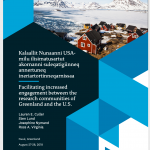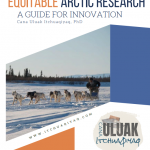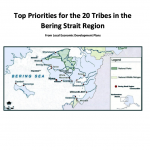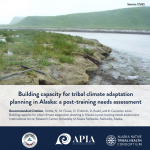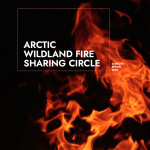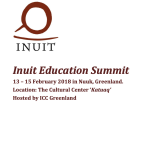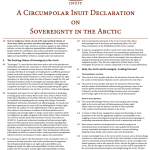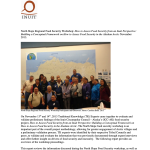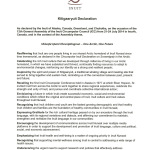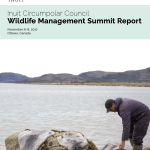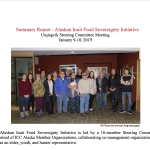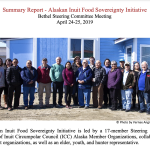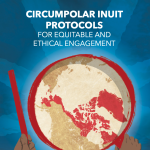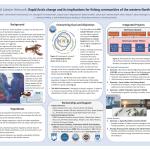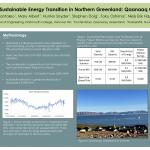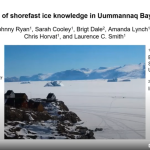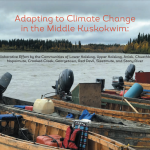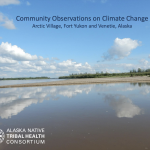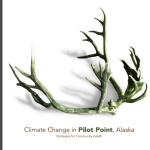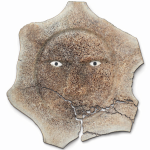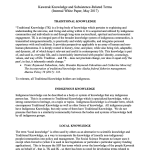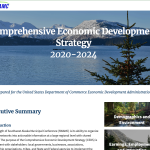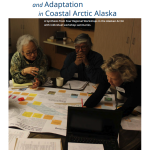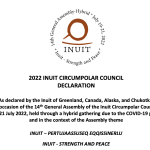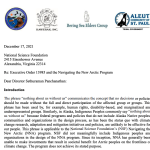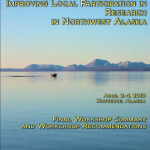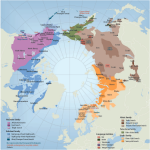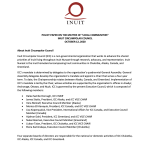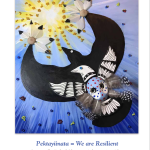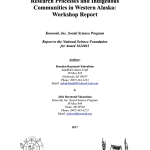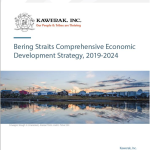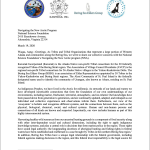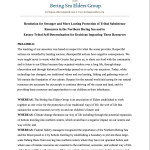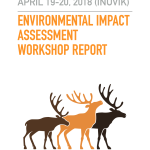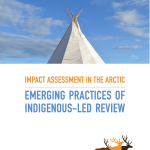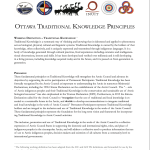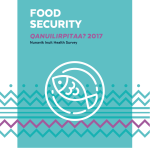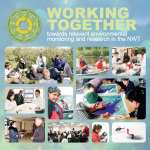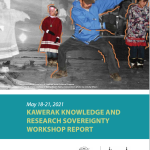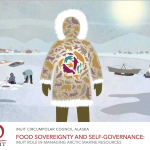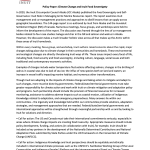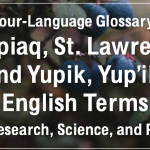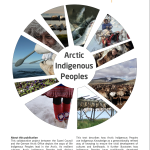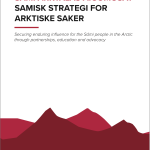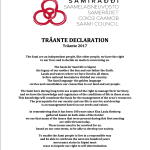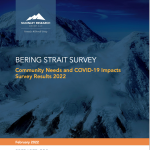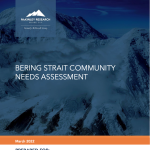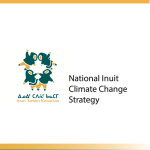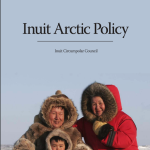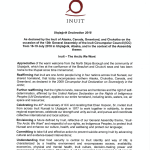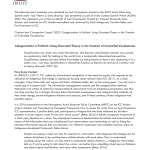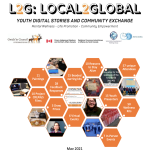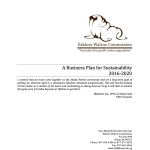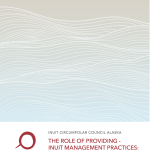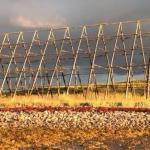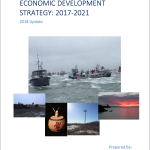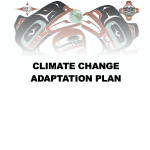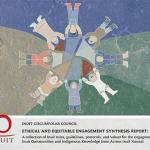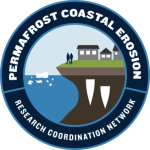Resources
The Russian Maritime Arctic
The Russian maritime Arctic stretches more than 160 degrees longitude from the Norwegian-Russian border in the west, to the Bering Strait in the east. It is Russia’s vast northern coastline, an open border to the Arctic Ocean, and a marine space that presents both strategic vulnerabilities and economic opportunities. The entire coastal area is arguably undergoing the most profound changes of any region in today’s Arctic. This essay seeks to identify key influential drivers of change, and uncertainties that will plausibly determine the region’s future.
Innovation exceeds fear of climate change in Greenland
Greenland is central to climate research and research now shows that Greenlanders are far more aware of a rapidly changing Arctic climate than of the underlying global causes. However, their willingness to harness new opportunities exceeds fear of climate change’s consequences.
Toward Advances and Applications for Landscape-Scale Coordinated Monitoring Networks in Alaska and Northwest Canada
Infrastructure and Community Resilience in the Changing Arctic: Status, Challenges, and Research Needs
Permafrost thaw is one of the world’s most pressing climate problems, already disrupting lifestyles, livelihoods, economies, and ecosystems in the north, and threatening to spill beyond the boundaries of the Arctic as our planet continues to warm. To examine the effects of permafrost degradation, and increase our understanding of what this phenomenon means for the future of the region (and the world), The Arctic Institute’s new two-part permafrost series aims to analyze the topic from scientific, security, legal, and personal perspectives.
Agents and the Arctic: The Case for Increased Use of Agent-Based Modeling to Study Permafrost
Permafrost thaw is one of the world’s most pressing climate problems, already disrupting lifestyles, livelihoods, economies, and ecosystems in the north, and threatening to spill beyond the boundaries of the Arctic as our planet continues to warm. To examine the effects of permafrost degradation, and increase our understanding of what this phenomenon means for the future of the region (and the world), The Arctic Institute’s new two-part permafrost series aims to analyze the topic from scientific, security, legal, and personal perspectives.
Breaking the Ice: ISE to Play Key Role in Shaping the Arctic's Future
Changing sea levels open northern shipping lanes but create new logistical challenges.
Conflict’s impact raises costs for Arctic shipping and the climate
Letter to the editor relating to Arctic shipping and climate.
Transforming permafrost coastal systems: Advancing scientific discovery through international collaboration
In the Alaskan Arctic, permafrost coastal systems are eroding at rates more than double those of the past. Rampant environmental change is putting new pressures on Arctic coastal dynamics, with the loss of landscapes, cultural heritage, infrastructure, and communities.
2023 Arctic Coasts Workshop Report: Changes, Impacts, and Solutions - Working Towards a Resilient Future
The Arctic Coasts Workshop was held on October 9 to 11, 2023 at the University of Colorado Boulder. 64 in-person and 4 on-line participants attended the workshop. The goal of the workshop was to bring together a dynamic group of experts to exchange knowledge regarding coastal hazards and impacts, strengthen and expand partnerships, and develop actionable and immediate recommendation for Arctic research and community resilience.
Kawerak-Region Tribal Research Protocols, Guidelines, Expectations & Best Practices
This document represents a Tribal vision from the Kawerak region about some key aspects of what Tribes want to see regarding the world of research. Topics covered include conceptualizing research, research oversight, planning research, conducting research, applying research, and information sharing and control.
Communicating science to policy: Writing policy briefs on why your science matters
Navigating the New Arctic Community Office (NNA-CO) and the Study of Environmental Arctic Change (SEARCH) offered an online workshop series to help researchers and collaborators communicate with policy makers. SEARCH & the NNA-CO walked through how to frame and prepare your Arctic research to be submitted as an “Arctic Answer” for publication in Arctic, Antarctic, and Alpine Research (AAAR), a peer-reviewed journal. Arctic Answers are two-page briefs designed specifically to share science with policymakers.
Open Science: Best Practices, Data Sovereignty and Co-production Booklet
These materials reflect a collaboration between the Arctic Data Center, the Navigating the New Arctic Community Office, and ELOKA as part of our organizational commitments to raising awareness and promoting best practices in data management, increasing data literacy, and engaging the community in conversations about data governance.
Facilitating increased engagement between the research communities of Greenland and the U.S. Institute of Arctic Studies
Equitable Arctic Research: A Guide for Innovation
This guide on Equity in Arctic Research provides practical strategies for you to create equitable and effective partnerships with Indigenous communities in your research. By using the strategies and resources in this guide, you can work toward:
- Building respectful and long-term relationships with Indigenous communities
- Incorporating Indigenous Knowledges and practices in a respectful and equitable manner
- Achieving more meaningful and successful Arctic research
NNA Project Update Report for Arctic Urban Risks and Adaptations (AURA)
Climate change is increasing vulnerability of arctic urban communities to natural hazards such as unstable permafrost, wildfire, and rain-in-winter events. These hazards put residents and property at risk and impose economic costs. Households, businesses, and governments must adapt to these multiple co-occurring hazards, which may have compound or off-setting interactions.
Collaborative Research - Arctic Urban Risks and Adaptations (AURA)- a Co-Production Framework for Addressing Multiple Changing Environmental Hazards
NNA project update video produced for the April 2020 virtual NNA Investigators meeting.
Understanding Future Systems of Transportation in Arctic Regions: Workshop for Navigating the New Arctic
Robotic vehicles are just realizing the potential to improve productivity in construction, transportation, agriculture, and mining in the continental U.S., but in the Arctic, research towards using these vehicles is much less advanced. In the Arctic, development still emphasizes building roads and opening shipping lanes.
A Workshop on the Role of New England in Navigating the New Arctic
A Navigating the New Arctic (NNA) project update video produced for the April 2020 virtual NNA Investigators meeting.
Preparing for a Northwest Passage: A Workshop on the Role of New England in Navigating the New Arctic
The rapid warming of the Arctic and melting of Arctic sea and land ice has ramifications around the globe. Shipping routes through an ice-free Northwest Passage in combination with modifications to ocean circulation and regional climate patterns linked to Arctic ice melt affect trade, transportation, coastal ecology and hydrology, human-built infrastructure, demographics and cultural identities, fish and wildlife, energy resources, and air and water quality -- not only in the Arctic but also in mid-latitude coastal regions such as New England.
Top Priorities for the 20 Tribes in the Bering Strait Region
Top Priorities for the 20 Tribes in the Bering Strait Region from Local Economic Development Plans
Building Capacity for Tribal Climate Adaptation Planning in Alaska
The Alaska Native Tribal Health Consortium (ANTHC) and Institute for Tribal Environmental Professionals (ITEP) provided 3 tribal climate adaptation planning trainings in Alaska from 2016 to 2017 (two jointly sponsored trainings in 2016 and 2017 and a 2017 training sponsored by ANTHC). This report summarizes findings from a web-based questionnaire distributed to tribal participants who attend these trainings to understand what additional resources and support they want to help their climate adaptation planning eforts. Findings are based on the analysis of 21 responses.
Shaping Arctic’s Tomorrow through Indigenous Knowledge Engagement and Knowledge Co-Production
This perspective piece characterizes the state-of-the-art and guidance for further advancement of Indigenous Knowledge and knowledge co-production in the Arctic. It identifies existing challenges and provides specific recommendations for researchers, Indigenous communities, and funding agencies on meaningful recognition and engagement of Indigenous Knowledge systems.
Arctic Wildland Fire Sharing Circle Summary Report
The event brought together multiple Working Groups, diverse participants, and a range of projects active and planned for the Arctic in an innovative way to learn, share, and discuss. It fostered a spirit of inclusiveness, and was unique in looking across borders and Working Groups to bring a truly circumpolar lens to wildland fire in the Arctic.
Inuit Education Summit
In recognition of the important role that education plays in economic, cultural, social, and political development of a people, and the critical education gaps faced by Inuit today, the delegates of the 2014 Inuit Circumpolar Council (ICC) General Assembly mandated the ICC Executive Council to hold an Inuit Education Summit prior to the next quadrennial ICC General Assembly in July 2018.
A Circumpolar Inuit Declaration on Sovereignty in the Arctic
We, the Inuit of Inuit Nunaat, are committed to this Declaration and to working with Arctic states and others to build partnerships in which the rights, roles and responsibilities of Inuit are fully recognized and accommodated.
North Slope Regional Food Security Workshop: How to Assess Food Security from an Inuit Perspective
This report reviews the information discussed during the North Slope Food Security workshop, as well as information gleaned from our other project activities to date. This report will be one component of several that will contribute to our final assessment tool and definition of Inuit food security and drivers of food in/security.
“Our ice, snow and winds”: From knowledge integration to co-production in the Russian SIKU project, 2007–2013
This paper explores the story of Russia SIKU (sea ice knowledge and use) project, a local and international effort on knowledge documentation and co-production with Indigenous knowledge related to sea ice and climate change. The Russia SIKU team also worked with agency managers, science planners and scientists to prioritize Indigenous knowledge and culture in science activities. Russia SIKU produced 5 dictionaries of ice, sea, weather and snow nomenclature in three local languages.
Co-management and the co-production of knowledge: Learning to adapt in Canada's Arctic
This paper draws on three co-management cases from the Canadian Arctic to examine the role of knowledge co-production as an institutional trigger or mechanism to enable learning and adapting. Policy implications of this analysis are highlighted and include the importance of a long-term commitment to institution building, an enabling policy environment to sustain difficult social processes associated with knowledge co-production, and the value of diverse modes of communication, deliberation and social interaction.
Kitigaaryuit Declaration
As declared by the Inuit of Alaska, Canada, Greenland, and Chukotka, on the occasion of the 12th General Assembly of the Inuit Circumpolar Council (ICC) from 21-24 July 2014 in lnuvik, Canada, and in the context of the Assembly theme, Ukiuqta'qtumi Hivuniptingnun - One Arctic, One Future
Wildlife Management Summit Report
The Inuit Circumpolar Council (ICC) hosted the Wildlife Management Summit that took place on November 6 to 8, 2017 in Ottawa, Ontario, Canada to deliver on the commitment made in Article 40 of the Kitigaaryuit Declaration, as adopted at the 2014 ICC General Assembly in Inuvik, which, “directs ICC to plan and host an Inuit summit on wildlife management.” The ICC Wildlife Management Summit’s goal was to examine the influence that policies (international, regional, national instruments), environmental change, public perceptions, and changing social economic conditions in the Arctic are having
Summary Report - Alaskan Inuit Food Sovereignty Initiative: Utqiagvik Steering Committee
The Action Plan will empower our people to seek reform and justice as we collectively work towards securing access and management rights over our traditional food resources and to create long-term systematic and policy change that will advance food sovereignty and benefit Inuit communities throughout our four regions of Alaska.
Summary Report - Alaskan Inuit Food Sovereignty Initiative: Bethel Steering Committee
The Action Plan will empower our people to seek reform and justice as we collectively work towards securing access and management rights over our traditional food resources and to create long-term systematic and policy change that will advance food sovereignty and benefit Inuit communities throughout our four regions of Alaska.
Ethics of knowledge production in times of environmental changes
This book chapter focuses on ethical considerations and guidelines for co-production, with a focus on Sámi and reindeer herders’ knowledge.
Improving dialogue among researchers, local and indigenous peoples and decision-makers to address issues of climate change in the North
This article draws on outcomes from a meeting of “local and indigenous peoples, decision-makers and scientists” held in Salekhard, Siberia to compare perceptions of the main issues (drivers and consequences of anthropogenic change) affecting health and well-being and recommendations to support collaboration to address these issues.
Lessons learned through research partnership and capacity enhancement in Inuit Nunangat
The authors of this article examines lessons learned about partnerships between researchers and Inuit communities in Inuit Nunangat, northern Canada, developed through the Arctic Corridors and Northern Voices (AC-NV) project, which included a significant youth training component and focused on understanding community-identified impacts and potential management options of increased shipping due to sea ice reductions and a changing climate.
Learning from knowledge co-production research and practice in the twenty-first century: global lessons and what they mean for collaborative research in Nunatsiavut
This paper shares the results of a systematic literature review of peer-reviewed and gray literature on knowledge co-production. The authors identify “guiding principles and approaches” that use to synthesize lessons from 102 case studies. They apply what they learn to frame an ongoing knowledge co-production project in Nunasiavut, Canada, the “Sustainable Nunatsiavut Futures Project.”
Assessing the sustainability and equity of Alaska salmon fisheries through a well-being framework
This article assesses the sustainability and equity of Alaska salmon systems through a well-being framework that incorporates indicators developed by a cross-disciplinary, cross-cultural project team.
Understanding and adapting to observed changes in the Alaskan Arctic: Actionable knowledge co-production with Alaska Native communities
The authors use lessons from seven Alaskan case studies to describe a typology of five elements important for the co-production of locally relevant actionable knowledge in Alaska.
Methodological sensitivities for co-producing knowledge through enduring trustful partnerships
The authors of this article reflect on co-production efforts in Aotearoa New Zealand, describing the learning process for non-Maori to address power asymmetries and learn to be manuhiri (those being welcomed on arrival to a place by the Indigenous people of that place). The authors contribute a set of “methodological sensitivities” to support co-production.
A global assessment of Indigenous community engagement in climate research
This article presents results of a systematic review of levels of Indigenous community participation and decision-making at different stages of the research process. The authors conclude that the majority of research on climate change practices an extractive model with little involvement of Indigenous community members. They develop indicators for assessing the level of Indigenous participation in climate change research.
Indigenous participation in peer review publications and the editorial process: Reflections from a workshop
This paper draws on discussions from a workshop on Indigenous involvement in the peer review and editorial process, and highlights the lack of space for Indigenous participation in these processes as they are currently implemented. The authors suggest concrete actions that can be taken to address the issue and also point to the importance of addressing equity throughout all stages of research.
Siku-Inuit-Hila: The dynamics of human-sea ice relationships: Comparing Changing environments in Alaska, Nunavut, and Greenland
This chapter describes a project to exchange and compare knowledge of sea ice involving community members and sea ice experts from Kangiqtugaapik in Nunavut, Qaanaaq in Greenland and Utqiagvik in Alaska. It emphasizes the importance of shared, mutual experiences in the field to support personal connections between Indigenous peoples and scientists.
Framing co-productive conservation in partnership with Arctic Indigenous peoples
This article, written by an Iñupiaq scholar, introduces the concept of co-productive conservation that encompasses both the co-production of knowledge and the co-production of public services to address biodiversity conservation in a way that upholds Indigenous knowledge, rights, and livelihoods.
Making room and moving over: knowledge co-production, Indigenous knowledge sovereignty and the politics of global environmental change decision-making
This article explains why efforts to “integrate” Indigenous knowledge into global change research and/or engage Indigenous peoples as “stakeholders” instead of self-determining nations fall short of what is required to practice co-production. They emphasize the interconnectedness of knowledge and governance and the importance of recognizing Indigenous governance within global change research.
Circumpolar Inuit Protocols for Equitable and Ethical Engagement
This document introduces protocols for equitable and ethical engagement of Inuit communities that were developed by the Inuit Circumpolar Council through consultation with Inuit from across Inuit Nunaat (Inuit homelands in Alaska, Canada, Greenland and Chukotka, Russia).
Equitable Arctic Research: A Guide for Innovation
The author, an Iñupiaq scholar from NW Alaska, introduces 10 tactics that researchers can enact to support equitable Arctic research with Indigenous communities.
‘Boundary spanners’: A critical role for enduring collaborations between Indigenous communities and mainstream scientists
This article highlights the important role of boundary spanners who are individuals with knowledge of both the Indigenous community context and mainstream science. The authors describe the characteristics of boundary spanners and explore attributes of successful partnerships, providing recommendations for how to better support boundary spanners.
Weaving Indigenous science, protocols and sustainability science
The authors reflect on Indigenous protocols that include caretaking and stewardship based on an ethic of relationship. They explore these protocols as they manifest in two Indigenous-led sustainability initiatives in the Great Lakes/Midwest North America and discuss implications for dialogue between Indigenous and sustainability sciences.
Indigenous Knowledge
This definition of Indigenous Knowledge also includes concepts to support its meaningful use together with scientific knowledge. Although it focuses on the work of the Arctic Council, these concepts are broadly relevant.
A framework for co-production of knowledge in the context of Arctic research
This paper argues that systemic changes are needed to support equitable participation of Arctic Indigenous peoples in research and offers a framework for co-production that can help researchers, decision-makers, and communities orient their work towards equitable and collaborative research.
Dear Colleague Letter: Open Science for Research Data (nsf20068) NSF - National Science Foundation
NSF announcement to make research data open.
Tidy Data
How to create tidy datasets that make working with data easier and more efficient.
Fundamentals in Data Management for Qualitative and Quantitative Arctic Research
An Arctic Data Center course on how to manage data for qualitative and quantitative research.
Credit Where Credit Is Due
Why all contributions to research need to be acknowledged.
Building reproducible analytical pipelines with R
How to do reproducible research and what tools to use.
Good enough practices in scientific computing
A guide to data management, programming, collaborating with colleagues, organizing projects, tracking work, and writing manuscripts for reproducible research.
Best Practices for Scientific Computing
A guide to scientific software development.
Rethinking academia in a time of climate crisis
What institutional changes need to take place to facilitate science for society.
Ten simple rules for implementing open and reproducible research practices after attending a training course
A guide to navigating the often overwhelming landscape of Open Science practices and where to start.
Transform to Open Science — NASA's Transform to Open Science Mission
A practical guide to implementing open science practices as an individual, within a research team and in an organization from the NASA TOPS program.
Open Software Means Kinder Science
Thinking about Open Science in terms of collaboration and human interactions
Circumpolar Inuit Protocols for Equitable and Ethical Engagement
Equitable and ethical engagement and the utilization of Indigenous Knowledge is required to inform research, assessments, monitoring programs, decision-making, policy and governance. Such an approach will ensure that all will have the best available information to make sound decisions that respond to conditions facing the entire global community.
What Lies Beneath? Peat Expansion in the Arctic Tundra (TundraPEAT)
Will the warming Arctic transform into a peat- and carbon-rich landscape, as the boreal zone is now, or are there essential conditions lacking in a warming Arctic that will prevent this?
The NNA Lobster Network: Rapid Arctic change and its implications for fishing communities of the western North Atlantic
Rapid Arctic warming and melting are altering ocean circulation in the North Atlantic, triggering ecosystem changes likely to undermine regional fisheries of New England and Atlantic Canada. These changes will challenge coastal communities, presenting new threats and opportunities. This NNA Research project focuses on links between Arctic change and the iconic American lobster fishery, the most valuable single-species fishery in North America, and a well-studied socio-ecological system.
TEK Talks: Shifting Perspectives on Working with Indigenous Peoples
“TEK Talks: Working with Indigenous Peoples" was a successful virtual lecture series on DEI topics and research ethics. It was hosted by the Geophysical Institute Graduate Student Association (GIGSA) at the University of Alaska Fairbanks (UAF) by two graduate students, Margaret, who is Alaska Native, and Anika, an international student from Germany. The series was in part a response to the letter from Western Alaskan Indigenous leaders criticizing NNA. This poster presents lessons-learned from our experience hosting TEK Talks to encourage others to create their own DEI lecture series.
Riverbank erosion and its consequences in the Yukon River Basin
Rivers and floodplains are particularly susceptible to a warmer climate due to permafrost thaw that can lead to accelerated erosion. This erosion threatens critical infrastructure and disrupts community life. Here we summarize objectives and early findings from a new NNA project to understand riverbank erosion and its impact on contaminants including heavy metals, such as mercury, along with carbon, nutrients and pathogens.
Responding to Energy Insecurity in Arctic Housing Using Community-Based Participatory Research
Rural communities in Alaska face many housing challenges. Existing housing is generally older, overcrowded, inefficient, and poorly equipped to withstand extreme weather conditions. These challenges result in a high energy burden on homeowners, as well as indoor environmental quality challenges. While there has been substantial efforts to support weatherization to mitigate energy inequality in these communities, the efficacy, service life, and homeowner use of such energy efficiency improvements can be better understood in order to drive further improvements to such programmatic efforts.
PSECCO: A New Community Office for Supporting Early Career Scientists and Advancing Equity and Inclusion in the Polar Sciences
While the polar sciences offer unique opportunities for international, transdisciplinary research as well as connections with Indigenous knowledge systems, the US polar science community remains unrepresentative of the diversity of the country itself. While there are many reasons for this, including those familiar throughout STEM as well as the explicit historical exclusion of certain groups in polar science specifically, early career scientists in the polar community are driving efforts to broaden participation in polar research.
Permafrost Grown: Cultivating convergence between farmers and researchers to foster sustainability for intensifying permafrost-agroecosystems
NNA Planning: Community-Based Mitigation and Adaptive Strategies for River Flooding and Erosion in Alaska Native Communities
Here we present preliminary planning work to inform village and regional decision making on mitigation and adaptation strategies. This work has been completed in collaboration with communities on the Kuskokwim River between 2021 and 2022, with the goal of co-generating a research design and approach for a multi-site study integrating local knowledge, Indigenous science, and western science.
Negotiating Expertise in the Greenland Hazards Project
The Greenland Hazards Project (GHP) partners Earth scientists from the University of Colorado Boulder (CU) and Virginia Tech (VT) with community, science, and government collaborators in Greenland to address the interplay between evolving natural hazards, society and infrastructure in the changing climate of Greenland. The goal is to build capacity for geodesy, remote sensing and machine learning at Greenlandic institutions and in Greenlandic communities.
Navigating the New Arctic through Investigating Ice-Structure Interactions
Arctic sea ice is thinning due to rapid climate change, potentially increasing access to Arctic waters for economic activities including shipping, exploration, and resource exploitation. Despite the ice is thinning, environmental changes make ice conditions more dynamic. This may lead to new loading conditions for marine structures that have been of minor relevance so far. The increase in maritime operations in the region generates concerns regarding their environmental impact (e.g., oil spills, structural damage on ships and marine structures, etc.).
Nature-Society Relationships Influence Household Adaptation to the Impacts of Climate Change
Individuals can adapt to the impacts of climate change by acting in anticipation of or in response to change, but what motivates households to act? This research draws on human-environment geographies to examine if social-ecological processes influence the amount of adaptation practices that are implemented by households.
Modeling a Sustainable Energy Transition in Northern Greenland: Qaanaaq Case Study
Many remote subsistence communities in the high Arctic rely solely on fossil fuels for heat and electricity. In Greenland, the government has reduced support for subsistence communities that receive significant fuel subsidies. In order to help enable a pathway for subsistence communities in northwest Greenland to continue their right to self determination, the feasibility of cost saving energy system improvements via renewable energy is explored.
Learning by Doing: Collaborative practice with the Native Village of Point Lay and regional partners on an NNA Track 1 project
Funded in 2019, the NNA Track1 project, Landscape Evolution and Adapting to Change in Ice-rich Permafrost Systems (NNA-IRPS) aspired to work with the Native Village of Point Lay and several regional partners to determine the best ways to engage the community in research and to ensure the research questions themselves and the data produced will be useful at the local and regional level.
Integrating Indigenous Knowledge to Co-Design more Effective Operations, Maintenance, and Management of Water Infrastructure in the Arctic
Rural Alaskan communities experience significant challenges in developing and operating water and sewer infrastructure systems. Their remote location, freezing temperatures, and regulatory hurdles often inhibit their ability to provide adequate water services. Moreover, engineered water systems are sometimes designed without using local knowledge and experience. Finally, training and certification requirements are often unreasonable and not suited to the local population, creating a gap in the local workforce.
Improved Navigation for Long Range Autonomous Underwater Gliders
Autonomous underwater gliders (AUGs) are long range vehicles, capable of traversing basin scale distances. However, AUGs currently lack sufficient navigation accuracy to traverse long distances without periodic surfacing to obtain GPS fixes and constrain the localization drift. We present a method and preliminary results from field trials for improved AUG navigation using a Doppler Velocity Log to dynamically profile water column currents.
Foundations for Improving Resilience in the Energy Sector against Wildfires on Alaskan Lands (FIREWALL)
Documenting social vulnerabilities, developmental shifts, and sea-ice change at four Arctic sites
The arctic is changing rapidly, with sea ice being one of the fastest changing aspects that directly impacts both indigenous communities that depend on sea ice for subsistence as well as Western developers looking for ways to navigate this change. The resilience of the arctic is one of the most important examples of sustainability in the face of climate change today; while the arctic is home to endangered species and millions of people, it is also one of the greatest-impacted spots of global warming in the world.
Developing Educational Resources for Greenland Students
The Greenland Rising Project worked with local schools and teachers to develop a suite of educational resources that have been tested by Greenlandic students from 7th grade through high school in three communities. Materials include hands on activities that support science concepts like isostasy, glacial physics, tidal data, sea level change, multibeam bathymetry, habitat mapping and an introduction to STEM careers.
Coastal Observers of Barrow Community-Based Monitors
Many coastal communities on the west and north coast of Alaska are threatened by coastal hazards (erosion, storm surge, permafrost thaw, sea ice loss) and that vulnerability is increasing as the environment changes with rapid warming. Using thermal sensors for thaw, an Argus camera system for wave dynamics, and survey instruments for erosion, Community-Based Monitors measure 9 beach profiles over time to determine changes from these hazards in collaboration with the North Slope Borough Office of Emergency Management (NSB OEM) and Applied Research in Environmental Sciences Nonprofit, Inc.
Climate impacts on terrestrial hydrology and hydrometeorology in Alaska and Yukon River Basin: a modeling effort guided by Indigenous Knowledge
The freshwater cycle in the Arctic is greatly affected by anthropogenic climate change. To provide “useable” rather than just “useful” climate information, we actively engage Indigenous participation in the research progress. As a foundation of capturing a trustworthy climate sensitivity of the freshwater cycle, we performed a multi-objective optimization on snow and river flow for a state-of-the-science land model, the Community Terrestrial Systems Model.
Balancing Wildfire Risks and Power Outages due to Proactive Public Power Safety De-Energizations
Faults on overhead power line infrastructures in electric power distribution systems (DS) can potentially ignite catastrophic wildfires, especially in areas exposed to high wind regimes, low humidity and dense vegetation. The common practice adopted by electric utilities to build resilience against such electrically-induced wildfires is called public-safety power-shutoff (PSPS): strategies to intentionally and proactively de-energize power line infrastructures to prevent wildfire risks.
Are Greenland’s Small-Scale Fishers Ready for Individual Transferable Quotas?
An investigation of Mid-Holocene Bering Sea bear bones to provide insight into modern-day polar bear population changes in response to climate change
This project is an investigation of ancient Bering Sea bear bones from the Margaret Bay archaeological site on Unalaska. Our goal is to provide cultural and morphological data for use in educational outreach and modern polar bear conservation. We used ethnographic methods to understand the cultural context of the Margaret Bay site and history of the Unangan peoples, their trade with nearby tribes, and traditional resource usage. We took comparative linear morphometrics from museum specimens to determine the species of origin through principal component analysis (PCA).
Acoustic Monitoring of Ocean Surface Wave Spectra with Autonomous Underwater Gliders
We present a new, low-cost method for monitoring wave spectra (significant height, period, and direction) using an autonomous underwater glider equipped with a low power scanning sonar. Unlike conventional fixed buoys, this method enables coverage across wide spatial areas, including remote and difficult to access regions, such as the marginal ice zone or areas with extreme sea states. Preliminary results indicate that this process can operate continuously for durations of weeks, with spatial coverage in excess of 1000 km.
A Permafrost Virtual Tour to Enhance the Permafrost Discovery Gateway
Virtual tours of landscapes and facilities may be created using low-cost 360-cameras, standard software packages, and basic web-hosting capabilities. Additional media may be layered onto tours to enhance the user experience. While the workflow is not arduous, time needs to be dedicated by a staff member who is comfortable with technology and willing to learn the process. Having a team willing to co-create a compelling narrative for the tour and design it with end use in mind is critical.
Co-production of Shorefast Ice Knowledge in Uummannaq Bay, Greenland
A Navigating the New Arctic (NNA) project update video produced for the April 2020 virtual NNA Investigators meeting. The video is narrated by Johnny Ryan (Brown University).
Adapting to Climate Change in the Middle Kuskokwim
In 2018, the Georgetown Tribal Council received a Bureau of Indian Affairs Tribal Resiliency Program Grant to create a climate vulnerability assessment and adaptation plan for the Middle Kuskokwim region. The Alaska Native Tribal Health Consortium (ANTHC) was contracted to facilitate the climate change adaptation planning process, and develop the final climate change vulnerability assessment and adaptation plan in collaboration with the communities of Lower Kalskag, Upper Kalskag, Aniak, Chuathbaluk, Napaimute, Crooked Creek, Georgetown, Red Devil, Sleetmute, and Stony River.
Community Observations on Climate Change: Arctic Village, Fort Yukon and Venetie, Alaska
For the Upper Yukon area, climate change has become a daily fact of life, causing a wide range of impacts to the environment, and in some cases to community health. In 2015 the Alaska Native Tribal Health Consortium (ANTHC) and the U.S. Geological Survey (USGS) organized a climate change impacts assessment in Arctic Village, Fort Yukon, and Venetie.
Climate Change in Pilot Point, Alaska: Strategies for Community Health
In the Yupik and Aleut community of Pilot Point residents report changes to the weather, landscape, plants and wildlife. Extreme weather events are thought to be more common, the timing of seasons is more unpredictable, erosion to shorelines is occurring at a rapid rate, and consequentially, vulnerability to flooding is increasing. Identified health concerns include food security, damage to health-critical infrastructure, injury and behavioral health issues related to extreme and unusual weather conditions.
Climate Change in Kivalina, Alaska: Strategies for Community Health
There are many uncertainties about the future of Kivalina, but it is obvious that climate change is resulting in serious health challenges that need to be addressed. It is hoped that this report will facilitate informed decision making, and the development of adaptive measures that encourage a sustainable and healthy future for Kivalina and other communities in the Northwest Arctic region.
Comprehensive Economic Development Strategy 2020-2024
The purpose of the Comprehensive Economic Development Strategy (CEDS) is engagement with stakeholders: local governments, businesses, associations, membership organizations, tribes, and State and Federal agencies to implement the collective best practices for the improvement of the regional economy. The CEDS is to be an evolving, guiding document for SWAMC, providing direction that supports economic development in the region backed by quantifiable data and the insight of our leadership.
Promoting Resilience and Adaptation in Coastal Arctic Alaska
This synthesis represents a summary of conversations during four workshops held in regional hub communities of Nome, Unalaska, King Salmon and Kotzebue. Over six months in 2016, almost 200 participants from 34 tribes, 14 state and federal agencies, local communities as well as several research institutions and nongovernmental organizations shared their insights on the most urgent risks and vulnerabilities for coastal communities and resources. They also identified key opportunities for collaboration between communities and agencies
2022 Inuit Circumpolar Council Declaration
Reaffirming that the Inuit Circumpolar Council (ICC) exists as the unified voice for Inuit at the international level. The principal goals of ICC are to strengthen unity among Inuit of the circumpolar region; promote Inuit status, rights, and interests on an international level; develop and encourage long-term policies that safeguard the Arctic environment; and seek full and active partnership in the political, economic, and social development of the Arctic,...
NNA Follow Up Letter
We—federally recognized Tribes and regional Tribal Consortia representing or comprised of over 75 federally recognized Tribes4—are writing to provide additional specific recommendations that can be used by NSF to ensure that NNA funding is spent well and achieves societal benefits.
Improving Local Participation in Research in Nortwest Alaska
In conjunction with the Northwest Arctic Borough, the Chukchi Campus of the University of Alaska Fairbanks organized the Workshop on Improving Local Participation in Research in Northwest Alaska. The National Science Foundation funded the workshop in its continuing effort to improve relations between researchers and local residents. The workshop occurred in Kotzebue April 2-4, 2013.
A framework for co-production of knowledge in the context of Arctic research
For too long, Indigenous Peoples of the Arctic and their knowledges have not been equitably included in many research activities. We argue for systematic change in how research-related activities are conducted in the Arctic. Bringing together multiple knowledge systems, specifically Indigenous Peoples' knowledge systems and science, can lead to more equitable, inclusive, and useful outcomes. The co-production of knowledge framework that we forward is designed to assist researchers, decision makers, and communities in moving toward those goals.
Oscarville Tribal Climate Adaptation Plan
Pektayiinata = We are Resilient
Research Processes and Indigenous Communities in Western Alaska
Research activities have become a regular occurrence in northern indigenous community life, a major factor influencing policy and management affecting these communities, and a source of various community impacts (positive, negative, and otherwise). Research processes span across the disciplines, including work in the natural sciences (e.g. physical oceanographic work, climatological research, fisheries and marine mammal research) as well as the social sciences (e.g. ethnographic studies, socioeconomic impact studies, and harvest survey research).
Bering Strait Comprehensive Economic Development Strategy 2019-2024
The Bering Strait Comprehensive Economic Development Strategy: 2019-2024 (CEDS) is the result of a continuous planning process at the local and regional level in the Nome Census Area of Northwestern Alaska. The goal of this process is to provide for sustainable and responsible development that benefits the people of the Bering Strait Region and improves the quality of life through economic opportunity. The current CEDS builds on the work of previous strategy committees and provides strategic direction for organizations and stakeholders in the region for the next five years.
Navigating the New Arctic NSF Comment Letter
Our organizations and communities are extremely concerned about environmental and other changes happening in the Arctic, as well as the research that is being funded and conducted on these topics. Our desire, and our request to you, is to work with us to create a collaborative, effective, and widely beneficial NSF funding mechanism.
Northern Bering Sea Resolution 2014
Resolution for Stronger and More Lasting Protection of Tribal Subsistence Resources in the Northern Bering Sea and to Ensure Tribal Self-Determination for Decisions Impacting These Resources
Environmental Impact Assessment Workshop Report
The goals of the Workshop were threefold: (1) to share information gathered through the Arctic Council project with the communities; (2) gain insights that can be shared with the Arctic Council project on best practices emanating from the Gwich’in Settlement Area; and (3) provide an opportunity to build capacity and facilitate discussions amongst those involved in Environmental Impact Assessments.
Impact Assessment in the Arctic: Emerging Practices of Indigenous-led Review
This report surveys options for Indigenous groups based on three models and case studies from the Canadian experience. This work is intended to assist Indigenous groups throughout the Arctic and beyond in deciding whether and how to establish their own Indigenous-led impact assessment processes over resource development in their homelands.
Ottawa Traditional Knowledge Principles
These fundamental principles on Traditional Knowledge will strengthen the Arctic Council and advance its objectives by supporting the active participation of Permanent Participants. Traditional Knowledge has been formally recognized by the Arctic Council as important to understanding the Arctic in numerous Ministerial Declarations, including the 1996 Ottawa Declaration on the establishment of the Arctic Council.
Food Security QANUILIRPITAA? 2017 Nunavik Inuit Health Survey
The general objective of the 2017 health survey was to provide an up-to-date portrait of the health status of Nunavimmiut. It was also aimed at assessing trends and following up on the health and health determinants of adult participants since 2004, as well as evaluating the health status of Nunavik youth. This health survey has strived to move beyond traditional survey approaches so as to nurture the research capabilities and skills of Inuit and support the development and empowerment of communities.
Working Together: Towards Relevant Environmental Monitoring & Research in the NWT
The Working Together: Towards Relevant Environmental Monitoring & Research in the NWT document was developed by the Cumulative Impact Monitoring Program (CIMP) and the Aurora Research Institute (ARI) as a guide to help the NWT research and monitoring community improve the significance and success of their programs by working more effectively with community partners.
Kawerak Knowledge and Research Sovereignty Workshop Report
For the May 2021 workshop, we wanted to hear from all of the Tribal participants about things they think are working and things that are not working with regard to how research is carried out in the Bering Strait region. This includes all types of research - for example, vessel-based research like marine mammal studies or trawl research; tagging of animals; research that involves deploying instruments in the water or air; research that involves interviewing community members or documenting Traditional Knowledge and other community information; and so on.
Food Sovereignty and Self-Governance: Inuit Role in Managing Arctic Marine Resources
In Alaska, Inuit recognized the lack of decision-making power and management authority to be the greatest threat to Inuit food security. One of the key recommendations of the 2015 report was to learn what is occurring within other Inuit regions, leading to a comparative analysis of co-management practices across Inuit Nunaat (homeland).
Policy Paper: Climate Change and Inuit Food Sovereignty
In 2020, the Inuit Circumpolar Council Alaska (ICC Alaska) published the Food Sovereignty and Self Governance: Inuit Role in Managing Arctic Marine Resources report. The report examines Inuit management and co-management practices and approaches to distill lessons that can apply across geographic boundaries.
Four-Language Glossary: Inupiaq, St. Lawrence Island Yupik, Yup’ik, & English Terms
As part of their broader efforts on Knowledge Sovereignty and Indigenization, partners and project team leads Kawerak Inc. and Sandhill. Culture.Craft organized and facilitated a gathering of Bering Strait region Indigenous language experts on December 17 and 18, 2019 in Nome, Alaska. The gathering was held at the Katirvik Cultural Center, and featured two days of intensive discussion, documentation, and recording of Indigenous terms related to research, science, and policy issues.
Arctic Indigenous Peoples
This collaborative project between the Saami Council and the German Arctic Office depicts the ways of life Indigenous Peoples lead in the Arctic. As resilient cultures, Arctic Indigenous Peoples hold distinct knowledge on how to respectfully use the environment to co-exist within the ecosystems. Even though resilience is enclosed within these cultures, the challenge of coping with both environmental changes and domestic regulations affects the practice and development of Indigenous Knowledge.
The Sami Arctic Strategy
The Saami Council has worked on Arctic issues since its early days. Seeing an increased national and international focus on the Arctic, the Saami Council has identified a need for an Arctic strategy to guide its work in this important area. This Arctic strategy aims to establish the Saami Council as an active partner for the civil Sámi society, governments, NGOs, IGOs, and others that, through international cooperation, will build a strong and sustainable Sápmi in the Arctic
Traante Declaration
The 21. Saami conference, represented by the Saami Council member organizations, gathered in Tråante (Trondheim) 9.-11. February 2017 on the occasion of the centennial jubilee of the first national Saami Conference, thank Tråante for our stay and states that: The Saami people have the rights described below; All requirements and positions presented below are in line with current or in any case rapidly developing rules of international law; Commits to work for these rights to be realized, and requires that States inside Sáami do the same.
Bering Strait Survey: Community Needs and COVID-19 Impacts Survey Results 2022
Kawerak partnered with McKinley Research Group, an Alaska research firm, to survey households in the Kawerak Service Area. The survey was designed to identify community strengths, challenges, and needs, as well as individual household needs. Impacts of the ongoing COVID-19 pandemic were also assessed. Survey results will be used to inform Kawerak strategic planning, services, and programs.
Bering Strait Community Needs Assessment
This 2022 Bering Strait Community Needs Assessment describes and analyzes strengths, challenges, and needs among communities in the Kawerak Service Area. In this summary, top regional strengths, challenges, and needs are presented for consideration in planning and decision-making.
National Inuit Climate Change Strategy
Inuit Nunangat is recognized as a global climate change hotspot, garnering national and global concern. We continue to emphasize that no one is more aware or concerned about the changes taking place in our homelands and their consequences than Inuit, as evidenced by our strident and effective advocacy for global action on climate change over the last three decades. We have an intimate understanding of how climate change is impacting the physical environment, and the wildlife and ecosystems that sustain us
Inuit Arctic Policy
Over the years, the Inuit Arctic Policy has become the main document for development on many issues in the Arctic and has contributed significantly in numerous ways as the Arctic has changed profoundly since the beginning of this work. Arctic states and others are invited to join with Inuit in the ongoing challenge of building and carrying out a common Arctic vision that is clearly supportive of the Arctic environment and beneficial to humankind.
Utqiagvik Declaration 2018: Inuit - The Arctic We Want
As declared by the Inuit of Alaska, Canada, Greenland, and Chukotka on the occasion of the 13th General Assembly of the Inuit Circumpolar Council (ICC) from 16-19 July 2018 in Utqiaagvik, Alaska, and in the context of the Assembly theme: Inuit - The Arctic We Want
Categorization is Political: Using Grounded Theory in the Creation of Controlled Vocabularies
By classifying and categorizing Arctic observations in accordance with knowledge systems of the people whose land the observation was taken on, Indigenous-led theories will be given their proper place in the role of Arctic observation. As a start, grounded theory informed by constructivism can begin to establish a preliminary classifications structure from pre-existing data. These preliminary re-classifications may align with Indigenous language & linguistic structure and categorization.
Local 2 Global: Bringing an Arctic Council Project to Inuvik, NT
L2G: Local 2 Global - Youth Digital Stories and Community Exchange - Mental Wellness, Life Promotion, Community Empowerment.
We partnered with the Western Arctic Youth Collective (WAYC), and contracted them to imagine, plan, and deliver events, as well as document their learnings, share recommendations, and create a guide for other youth groups to take on similar events. We also established an Advisory Committee to support the work.
A Business Plan for Sustainability (2016-2020)
Two significant priorities to accomplish in FY 2015-2016 include identifying sustainable funding and strengthening the capacity and role of the commission as a catalyst for positive Eskimo Walrus Commission: A Business Plan for Sustainability 2015-2020 November 2015. The development of this Business Plan for Sustainability is directly tied with outcomes identified for both of those priorities.
The Role of Providing - Inuit Management Practices: Youth, Elders, Active Hunters and Gatherers Workshop Report
The Indigenous Knowledge, values, concepts, and information shared in this report were brought forward during the Youth, Elders, Active Hunters and Gatherers (YEAH) workshop held in Bethel, Alaska, on February 25 and 26, 2019. The workshop brought together Inuit from across Inuit homelands of Alaska and the Inuvialuit Settlement Region in Canada.
Co-Creating Research Projects: Some Personal Experiences from Saami Council and Arctic Researchers
"Inclusion of Indigenous Peoples in co-creating research projects is often perceived as challenging both from the perspective of the researchers and the Indigenous Peoples and communities. Indigenous partners often note that the inclusion process tends to be an administrative check mark rather than establishing a long-term good working relationship between the research team and the Indigenous partner.
Bristol Bay Comprehensive Economic Development Strategy: 2017-2021
"Through the Bristol Bay CEDS and other initiatives, the region is implementing the Bristol Bay Regional Vision. The Bristol Bay Partnership with Bristol Bay Native Association as the lead organization sponsored the Vision to hear from the people about their hopes and dreams for the future. The CEDS is a planning tool used to map out where Bristol Bay wants to go, reduce redundancies, attract investment, and encourage partnerships."
Climate Change Adaptation Plan
"Tlingit & Haida has worked to determine what changing climate conditions will occur in southeast Alaska and potentially affect all southeast Tribes; and prioritized each area of concern with a ranking based off of vulnerability and importance to the citizens and culture alike."
ICC Ethical and Equitable Engagement Synthesis Report
A collection of Inuit rules, guidelines, protocols, and values for the engagement of Inuit Communities and Indigenous Knowledge from Across Inuit Nunaat
Permafrost Coastal Erosion Research Coordination Network (PCE-RCN)
The Permafrost Coastal Erosion Research Coordination Network (PCE-RCN) is established to identify challenges of and solutions to Arctic coastal permafrost erosion as well as its socioecological impacts by converging natural sciences, social sciences, and engineering. The project is funded by the Office of Polar Programs of the National Science Foundation.
Whose Land: Treaties and Agreements
Whose Land is a website that assists users in identifying Indigenous Nations, territories, and Indigenous communities across Canada. This website offers several videos of Indigenous perspectives about their homelands and land acknowledgements.
Are you planning to do a Land Acknowledgement?
This short article by the editors of American Indians in Children’s Literature (AICL), Dr. Debbie Reese of Nambé Pueblo and Dr. Jean Mendoza, offers a list of suggestions for creating and delivering land acknowledgements.
Beyond Territorial Acknowledgements
This article from the Âpihtawikosisân, a blog by Chelsea Vowel (Métis), discusses the purposes, practices, and spaces for land acknowledgements.
Research, Communication, and Land Relations
This YouTube video is the first keynote lecture of the 2021 Inclusive SciComm Symposium, featuring Dr. Max Liboiron (Red River Métis/Michif) of Memorial University of Newfoundland.
Doing Land Acknowledgements
This guide, by the Xwi7xwa (pronounced whei-wha) Library at the University of British Columbia, supports researchers working with Indigenous topics to create land acknowledgements, including virtual land acknowledgements.
You are on Indigenous Land
This brief report, written and complied by Melissa Shaginoff (Ahtna and Paiut), offers resources and considerations for recognizing Indigenous Peoples through land acknowledgment.
A Guide to Indigenous Land Acknowledgment
The Native Governance Center co-hosted an Indigenous land acknowledgment event with the Lower Phalen Creek Project on Indigenous Peoples’ Day 2019. The event featured panelists: Dr. Kate Beane (Flandreau Santee Dakota and Muskogee Creek), Mary Lyons (Leech Lake Band of Ojibwe), Rose Whipple (Isanti Dakota and Ho-Chunk), Rhiana Yazzie (Diné), and Cantemaza (Neil) McKay (Spirit Lake Dakota).
Resilience and Adaptation to the Effects of Permafrost Degradation Induced Coastal Erosion
A Navigating the New Arctic (NNA) project update video produced for the April 2020 virtual NNA Investigators meeting. The video is narrated by Dr. Ming Xiao (Pennsylvania State University).
Roads and Airfields on Permafrost: A Synthesis of Practice
Billy Connor of the University of Alaska Fairbanks presents this webinar to accompany a manual he co-authored with other experts for the Alaska Department of Transportation and Public Safety.
Manual for Roads and Airfields Constructed on Permafrost
Billy Connor of the University of Alaska Fairbanks has published a manual for construction on permafrost he co-authored with Douglas J. Goering, Mikhail Kanevskiy, and Erin Trochim of UAF and Kevin L. Bjella of USACE CRERL and Robert McHattie of GZR Engineering, for the Alaska Department of Transportation and Public Safety (AKDOT&PF). The manual is titled "ROADS AND AIRFIELDS CONSTRUCTED ON PERMAFROST: A Synthesis of Practice" and is available through Scholarworks.
Permafrost History and Vulnerability to Climate Change in Alaska
Permafrost History and Vulnerability to Climate Change in Alaska Alaska Institute for Climate & Energy (ALICE) Webinar, April 20, 2021
M. Torre Jorgenson, Alaska Ecoscience, Fairbanks, AK
NSF and the Ocean Decade: Resource for Researchers Involved in the NSF's Endorsed Ocean Decade Actions
This document is a resource for NSF staff and researchers (including PIs, postdocs, students, etc.) funded through one of the five NSF Ocean Decade Actions (Navigating the New Arctic (NNA), International Ocean Discovery Program (IODP), GEOTRACES, Global Ocean Biogeochemistry Array (GO-BGC), and Coastlines and People (CoPe)) officially endorsed by the Intergovernmental Oceanographic Commission (IOC). The context provides context and resources for engagement in the Ocean Decade and will evolve as opportunities within the Ocean Decade change in the coming years.
NNA-CO Overview Flyer
Supporting highly collaborative research toward a more resilient, healthy, and equitable Arctic that is understood and stewarded for its role in the global system.
